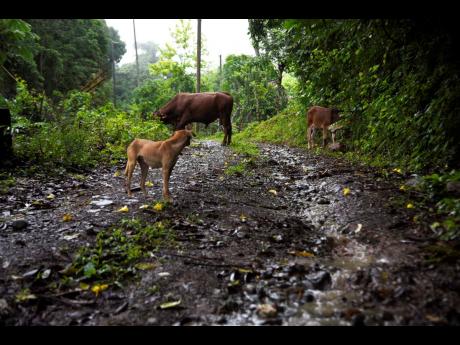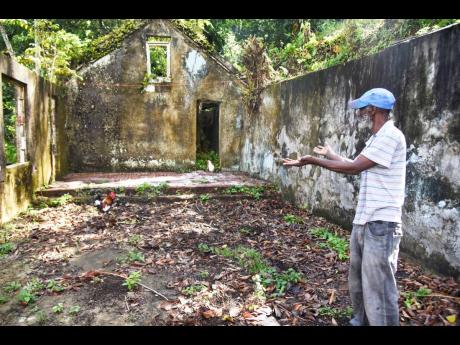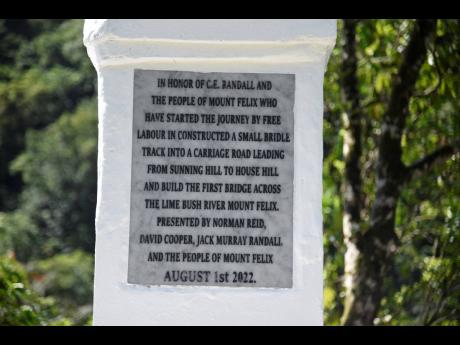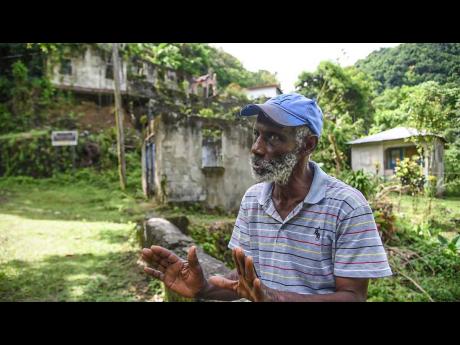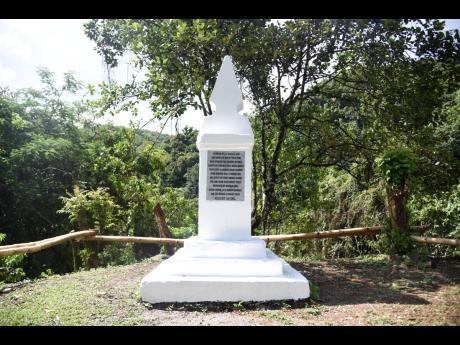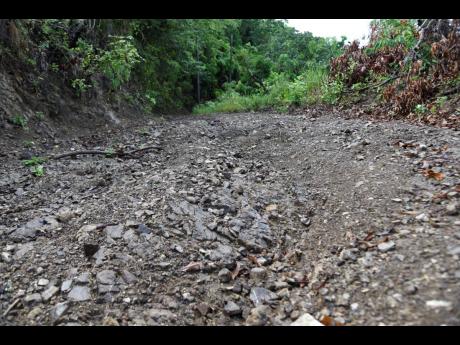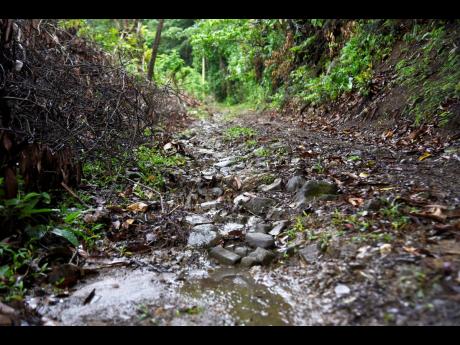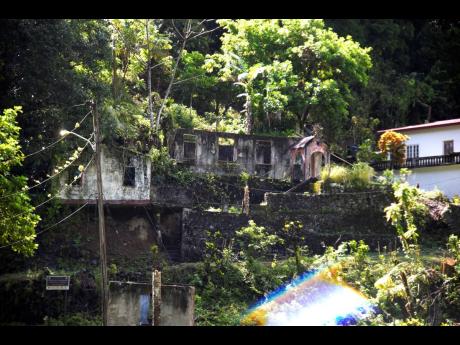Mount Felix – paradise on Earth lies deserted
If you journey into Mount Felix, St Thomas, on a weekday morning, you will more than likely find one resident, Richard Thompson, strolling through the hills to the nearest active town in Sunning Hill.
Mount Felix is located 4.5 miles north of Bath Botanical Gardens. It is now a dead community at the foot of the John Crow Mountains, bounded to the west by the banks of the Rio Grande and joins with the eastern end of the Blue Mountains northeast of St Thomas.
The once buzzing rural community of Mount Felix with hundreds of farming residents now has about 27 residents, numerous empty houses, a roofless, windowless and doorless abandoned Church of God of Prophecy with fowls resting below a huge wasp nest or picking on fruits fallen from a June plum and guava trees with roots below the tiles of the church, a broken-down and roofless post office with overgrown trees, closed shops with rusty locks and duck ants feasting on the wooden structures, overgrown bushes, and an undisturbed free-flowing Lime Bush River.
Thompson travels to the nearest town in Sunning Hill each day because he said the community is lonely and all he has is his battery radio to keep him company.
“Maybe 9:30 a.m. mi start walk and slide dung di hill de, and dung de whole day, and at nights, mi tek mi time and come up. A nuh me alone, some guys up the top deh, used to come up. But when mi want to see the vehicle dem and maybe some of the excitement dem, a dung a Sunning Hill, so mi affi go dung deh,” he told The Gleaner during a visit to the community recently.
According to Thompson, the number of residents has decreased from about 300 in the last decade because people migrated due to the poor and continuously depreciating roadway which was first opened in 1929 by Governor Sir Reginald Stubbs, and was started as a small bridle track by Crooks E. Randall.
VERY DANGEROUS
Randall migrated to the community in 1920 after he bought a piece of property and lived in House Hill near Mount Felix. At that time, it was very dangerous to cross the Lime Bush River, so he and the Volunteers of Mount Felix built a bridge. Randall’s attitude of self-reliance made him enemies as well as friends. For 13 years, they work tirelessly until the road was completed, connecting Sunning Hill, Mount Felix, House Hill and Cuna Cuna that leads to Moore Town, Portland.
Thompson, who is now in his 70s, said people would gather on the bridge when he was in his 20s.
“People used to drink here and drunk and sit anywhere here, but there is nobody here. Dem gone now. When the shop dem did a function, bread van used to come right here. For the postal agency, people used to leave from Sunning Hill and come up here so, but from the road stay so, nobody nuh come da side again, unless they have to come,” Thompson told The Gleaner.
Thompson remained in the community because he has nowhere else to go, and the mother of his three children migrated to the US and filed for the children in the 1990s.
“Me no have nowhere fi go. Mi can’t go a Morant Bay [and] Lyssons, because mi no have no family up deh, no way, a yaso, so from Sunning Hill, Cross Pass [to] Mount Felix. Mi naav no where else fi go,” he said.
He told The Gleaner that he was a part of the farmers who earned from planting crops in the community, primarily bananas that were sold to the United Food Company, and other variety of crops, such as pumpkin and cabbage.
“People used to plant everything, but because of the conditions of the road, the people escape. People out there wuda like fi come back [but] who do we contact?! Up here used to be fruitful and they used to plant everything on a large scale, but because of the situation of the road, the people escape,” Thompson, who now raises goats for a living, said.
“Cabbage truck used to go Mount Felix twice a week. Mi old now. Mi can’t chop dung no weh again, and more over, more over, if mi coulda do it, it wuda coming like a waste of time [because] mi can’t carry no load again. Mi can’t carry load again and dung a Sunning Hill the market truck come; a Morant Bay di market deh, so mi can’t carry load gaa dem deh place deh fi sell it a market,” he added.
Thompson, who has watched the roads for Sunning Hill, Bath Road and Mount Felix depreciating, is of the view that the Government is responsible for fixing the roads leading in and out of the community.
He told The Gleaner that he had watched the road depreciating for the last 12 years. He said they have only been given promises by politicians over the years for repairs to be done. Dr Michelle Charles, St Thomas Eastern member of parliament, declined to comment on the issue.
The constituency was represented by Dr Fenton Ferguson from 1993 to 2020.
Norman Reid, one of the residents who has migrated to the United States of America, said he and other foundation residents would like to return and construct houses, but the state of the road is not suitable to have trucks pass with the material.
“I am sure if C. E. Randall was alive today, he would be very disappointed to see the drastic deterioration of the road to Mount Felix for which he and the men and women worked so hard to build. Due to lack of maintenance over the years, most of the road is gone except for the occasional patches of asphalt that was laid by Councilor Avis Eccleston in 1968. In the present condition of the road, it is difficult to tell that there was a time when motor vehicles travelled this road daily back and forth,” he said.
A BEAUTIFUL PLACE
Reid was a part of a group of migrated residents from Mount Felix, who erected a monument in honour of Randall on Emancipation Day.
The plaque states, “In honour of CE Randall and the people of Mount Felix who have started the journey by free labour in constructing a small bridle track into a carriage road leading from Sunning Hill to House Hill and built the first bridge across the Lime Bush River [in] Mount Felix”.
They believe erecting the monument could possibly draw more tourists into the area to bask into the peaceful setting and learn of the history behind its former development.
“Mount Felix was and still is a luscious, cultural, historical and beautiful place for tourism, a picture of paradise on Earth. The primary school which had an enrolment of more than 300 students is still there. Another symbol of the vitality of past life of Mount Felix is the Church of God church which still stands. Mount Felix also had its own postal agency; as to crime, it was almost nil. There never had to be any police visitation, other than generally visits by the Bath Police,” Reid said.
“In those days Mount Felix was a lively place from which agricultural was top priority. Produce was trucked on a daily basis, cocoa was trucked every Thursday, banana every Monday and Tuesday, regular market trucks, Thursdays, Friday and Saturdays, but as the road deteriorated and became treacherous, the district lost its economic base because there were no more trucks to take out the produce. People then started to move to lower ground. Although electricity came to Mount Felix in 1977, it did not stop the exodus of its people,” he added.
Although remote, Reid believes Mount Felix, even with limited access, could be one of Jamaica’s tourist attractions.
During the interview with The Gleaner, Reid addressed Randall as a hero, because he conceptualised the idea of changing the bridle into a carriage road.
Reid and Thompson believe the Government is responsible for fixing the road.
“It fall on deaf ears when mi report it, so me nuh know. People out there would a like fi come back. Di people tell them [that] we would like to go back and farm, and ‘yes, they [the authorities] going fix it’, and see it, same way,” Thompson said.

